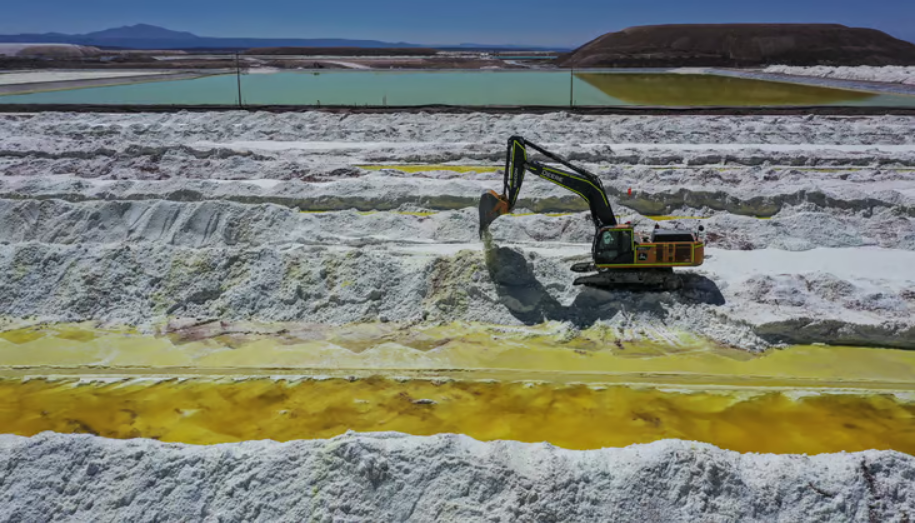
By Charles Chimdiya Asiegbu
Posted on October 28, 2024 10:38
Nigeria’s growing lithium industry holds enormous promise. As investors move in, can the country prevent mines poisoning soils and livelihoods?
Lithium, often referred to as “white gold”, is a critical element for the global energy transition, especially as the world shifts to electric vehicles (EVs) and renewable energy storage. For a country like Nigeria, which has long relied on oil and gas, lithium presents an opportunity to diversify its economy, create jobs and attract foreign investment.
Already, major players are investing in Nigeria’s lithium reserves. Companies such as Avatar and Ganfeng Limited are building lithium processing facilities in Nasarawa State. At the same time, Jupiter Lithium Limited and ReElement Technologies have announced a joint venture targeting deposits in Kaduna State. These investments signal Nigeria’s growing appeal as a source of this valuable resource.
Managing natural resources
However, with opportunity comes significant risk. Nigeria’s history of managing its natural resources is fraught with environmental and social issues. The most glaring example is the 2010 lead poisoning disaster in Zamfara State, where hundreds of children died due to contamination caused by illegal gold mining. This tragic event is a stark reminder of what can happen when mining activities are poorly regulated.
READ MORE China’s Zijin and Australia’s AVZ grapple over DRC’s lithium
The environmental risks posed by lithium mining are substantial. Although Nigeria’s lithium deposits are primarily hard rock, which requires less water than brine extraction, the process still produces waste rock, chemical by-products, and air pollutants. Without stringent regulations, these could lead to water contamination, land degradation, and serious public health concerns.
Global examples of poorly managed lithium extraction should serve as a warning. In countries where brine extraction is used, the process can deplete already scarce water resources and release toxic metals into the environment. The United Nations Environment Programme has noted that extracting one tonne of lithium can require as much as two million litres of water. While this may not be a direct threat in Nigeria’s hardrock mining, the risks of land degradation and air pollution remain.
Avatar and Ganfeng’s projects in Nasarawa, along with the Jupiter Critical Minerals Project in Kaduna, are steps toward capitalising on Nigeria’s lithium reserves, but these ventures must be closely monitored. The government has introduced measures to encourage local processing and protect mineral assets, yet its track record on enforcement leaves much to be desired. The failure to adequately police illegal mining activities, especially in rural areas, has caused significant damage, as seen in Kwara State, where unlicensed miners have ravaged farmlands and polluted rivers.
READ MORE Copper and lithium at the heart of new African investment
Bani, a once-thriving farming community in Kwara, is now scarred by the illegal lithium mining that has devastated its ecosystem. Farmers have been forced off their land, and children have abandoned school to join the mining trade. Despite government crackdowns, illegal operations continue to flourish in these remote areas, often beyond the reach of authorities.
Environmental protection
Africa Insights
Wake up to the essential with the Editor's picks.
For Nigeria to fully benefit from its lithium potential, it must prioritise environmental protection and ensure that mining operations adhere to international standards. The government should work with mining companies to implement Environmental, Social, and Governance (ESG) frameworks, ensuring that operations are sustainable and socially responsible. This means carefully managing waste, limiting air and water pollution, and safeguarding the health of local communities.
The stakes are high. Lithium could provide Nigeria with the revenue and economic diversification it so desperately needs. But if the country repeats past mistakes—failing to regulate mining activities, protect the environment, and ensure the well-being of its citizens—the consequences will be devastating.
READ MORE Mining Indaba: The scramble for African minerals and energy resources
Nigeria’s lithium rush is an opportunity, but one that must be seized responsibly. The lure of white gold must not blind the country to the environmental and social costs that come with it. Proper regulation and oversight are essential if Nigeria is to strike the right balance between economic growth and environmental stewardship.
Only then can the country ensure its lithium wealth benefits both present and future generations.


Comments1
Does retarding Blacks less make Earth smarter?
Does retarding Blacks less make Earth smarter?